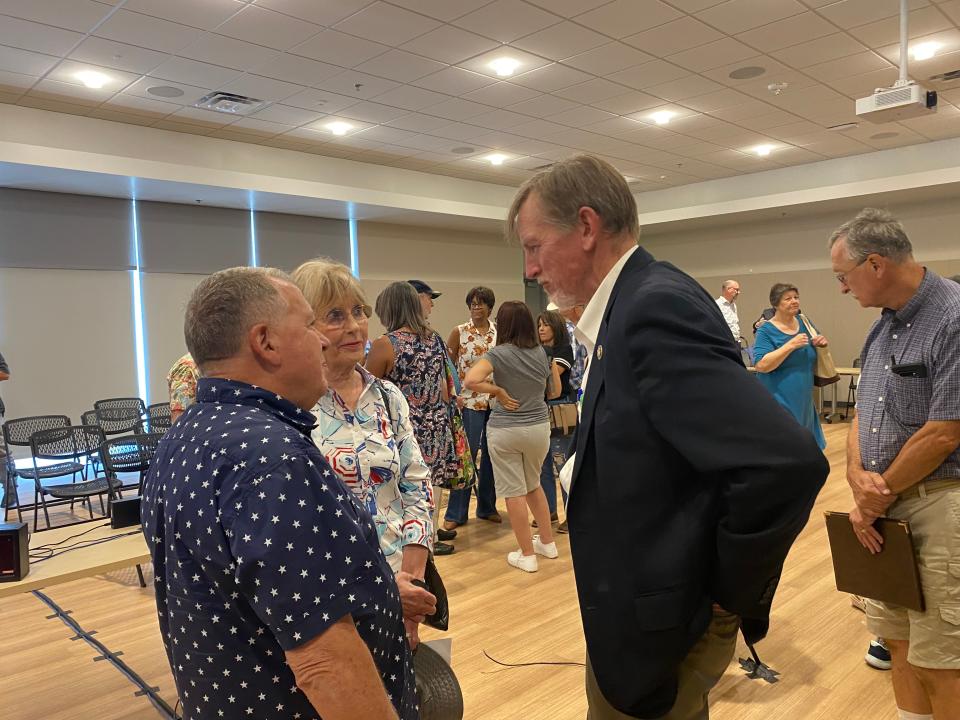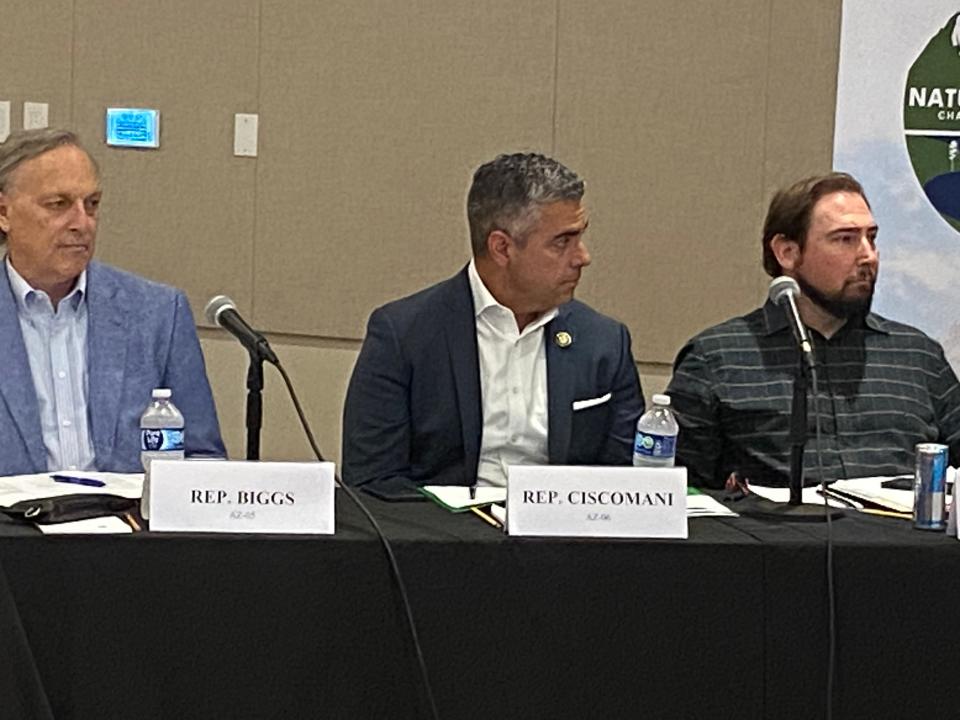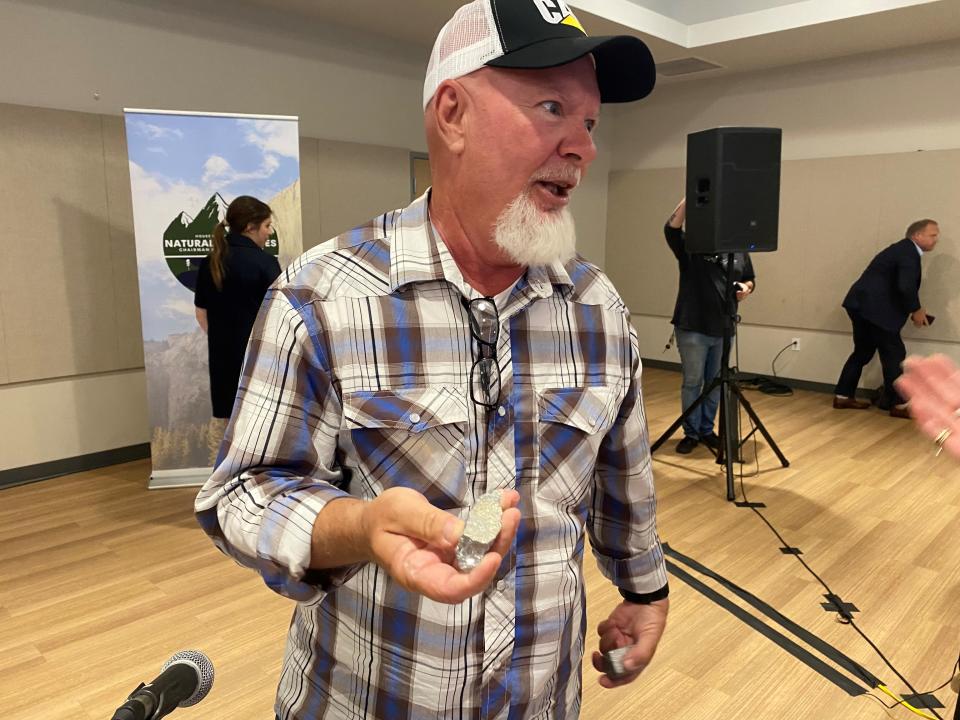Arizona needs mining, GOP lawmakers say, as Apache runners protest Oak Flat copper plan
U.S. Rep. Paul Gosar led a congressional hearing on Friday in Goodyear where a panel of other House members, mining industry leaders and lobbyists advocated for greater access to mined materials like copper and rare earth minerals.
"Minerals like copper, lithium, cobalt fuel our modern way of using high-tech applications like smartphones and satellites," said Gosar, R-Ariz.
The growth of renewable technologies to achieve the Biden administration's goals of "net-zero" emissions will require massive amounts of new materials to build electric vehicles, renewable energy-generating capacity and battery storage. Gosar said that would require a six-fold increase in mining.
But he asserted that China either partially or totally controls 43 of the 50 critical minerals listed by the U.S. Geological Survey. The publication Foreign Relations found that the U.S. is 100% import-dependent on 12 critical minerals and more than 50 percent import-dependent on 32 others, with China the largest import source for 26 of the listed critical minerals.
Gosar said even phosphate, used in commercial fertilizers, comes from China. If China were to cut off the phosphate supply, he said, the U.S. food supply would suffer.

The hearing took place as, 125 miles away, a group of runners made a nearly 100-mile trek from the San Carlos Apache Reservation to Mount Graham to protest a proposed copper mine and raise awareness of how they believe the federal government fails to protect sacred tribal sites.
The grassroots group Apache Stronghold, other Native activists and their allies have fought for nearly 20 years to stop a mine that would obliterate Oak Flat, one of the Apache people's most sacred sites. The mine would use a new mining method known as block cave mining, a systemic excavation process that would leave behind a crater about 1,000 feet deep and about 1.8 miles in diameter.
The subsidence would destroy Oak Flat, a riparian area about 60 miles east of Phoenix that sustains the site's eponymous Emory oak and other species, and the underground water sources that created the site.
Feds should loosen rules to expand mining, supporters say
At the hearing in Goodyear, the focus turned to China. Several representatives expressed alarm over that country's chokehold on critical minerals, calling it a "dangerous reliance." U.S. Rep. Debbie Lesko, R-Ariz., said if America doesn't wake up to China's manipulations, "we're all going to be speaking Mandarin."
Gosar and others said there are solutions: loosen up what they called onerous agency regulations that they said throttle the permitting process, and rein in the judiciary by reforming the tort process. U.S. Rep. Juan Ciscomani, R-Ariz., said federal agencies are almost immune to accountability. Also, the group said, a multitude of lawsuits impedes the permitting process.
U.S. Rep. Andy Biggs said he and his fellow Republicans had passed a bill to streamline energy extraction permitting, but that the Senate had held it up.
Arizona produces the most copper in the U.S., he said, which is why school kids learned that one of the state's famed "Five Cs" is copper. (The others are cattle, citrus, cotton and climate.)

Lesko and Gosar also decried the resistance to mining uranium in northern Arizona because the U.S. currently relies on Russia for high-grade uranium. Gosar said smaller "modular" nuclear plants could serve to power the nation in place of the huge plants currently in operation.
Misrael Cabrera, the former director of the Arizona Department of Environmental Quality who now heads up the University of Arizona's School of Mining and Mineral Resources, said the Mining Act of 1872 could still serve the nation.
"Just because it's old doesn't mean it's outdated," he said.
What to know: Proposed Grand Canyon monument could turn 1.1 million acres into protected land
Cabrera also said modern mining methods are much safer than in past years. And in response to a question by Gosar, Cabrera said the northern Arizona uranium deposits, contained in long veins known as Breccia pipes, would be safer out of the ground so they don't leach into groundwater.
"Nuclear is safe, economical and clean," he said.
Gosar and U.S. Rep. Mike Collins, R-Georgia, both decried President Joe Biden's moves to limit mining, including the withdrawal of the final environmental impact statement for the Resolution Copper mine project, the stalled progress on a copper and nickel mine in Minnesota, the recent call for a 1.1-million-acre national monument in the Grand Canyon region to prevent new uranium mining, and the withdrawal of 336,000 acres surrounding Chaco Culture National Historical Park to new oil and gas leasing.
U.S. Rep. Eli Crane, whose sprawling district encompasses Oak Flat, said he had three priorities for any mines in Arizona: economic impact, national security and preserving the environment.
"We need to do (mining) in a clean and safe manner that protects our air and water," he said.

Craig Wiita, who heads a refining operation in Prescott, said new federal regulations had eliminated 75% of his available product. Wiita's company, Del Sol Refining, handles rare earth elements like tellarium, antimony and other such minerals needed in solar panels, ammunition and other manufacturing. But, he said, small companies must expend about 25% of their resources pursuing permits in a process that takes seven to 10 years.
"That's a huge amount for a small company," he said.
Wiita also said germanium, a metal much used in the electronics industry, can be found in a huge deposit in Idaho, enough to serve the entire nation.
Recycling won't be enough to satisfy the growing demand for minerals to power a renewable energy grid, Wiita said. He said solar panels and electric vehicle batteries should still be recycled to keep toxic materials out of landfills and groundwater supplies.
Wiita also would like to get his hands on some of the funds the Biden administration has allocated for exploration for critical minerals. That way, he said, he could keep his staff, although so far he's managed to avoid laying anyone off after most of his business melted away.
"I haven't seen a dime of that," he said.
Opposition to mining at Oak Flat
The GOP delegation's stance is opposed by many people both within Arizona and across the nation. Native rights group Apache Stronghold, led by former San Carlos Apache Chairman Wendsler Nosie, has been fighting to prevent international mining giant Resolution Copper from building a huge copper mining operation at Oak Flat, one of the Apache people's most sacred sites.
Oak Flat, or Chi’chil Biłdagoteel, "the place where the Emory oak grows," is also culturally important to other Southwestern tribes, and is one of Arizona's remaining riparian zones and a popular site for recreational users.
The 2,200-acre site, currently a campground in the Tonto National Forest, has been at the heart of a nearly 20-year-long struggle among tribes, environmentalists, the U.S. government and Resolution Copper, which is owned by multinational mining giants Rio Tinto and BHP.
Congress approved a land swap of other environmentally sensitive lands in Arizona for Oak Flat between Resolution and the U.S. Forest Service in December 2014 after a 10-year effort by Resolution to make the deal. Apache Stronghold filed suit in January 2021 to halt the swap. Parties to the litigation are currently awaiting a decision by the 9th U.S. Circuit Court of Appeals after a hearing in March by the entire 11-judge panel.
Added to suit: Federal court allows international mining giant to oppose tribes in Oak Flat lawsuit
In May, the U.S. District Court in Arizona allowed Resolution Copper to join Apache Stronghold's lawsuit.
Nosie or anyone from his group was not present at the hearing. They were running east from the Old San Carlos Memorial in Peridot to Mount Graham, home to more Apache sacred sites. Nosie was aware of the hearing, and in a statement sent to The Arizona Republic, he said, "Arizonans need to know that this mining project will destroy our sacred sites, take away our water, and contaminate our environment forever."
Nosie urged people to speak up for the state's spiritual, cultural and environmental well-being.
San Carlos Apache Tribe invites lawmakers to meet at Oak Flat
Upon learning of the hearing, the San Carlos Apache Tribe sent a letter to Gosar, who heads the House Natural Resources Committee's oversight and investigations subcommittee, citing its own concerns over Rio Tinto and BHP's own ties to Communist China.
"We suggest meeting on sacred Apache ground at Oak Flat following your field hearing in Goodyear on Friday afternoon," said San Carlos Chairman Terry Rambler in a letter addressed to the five lawmakers.
Gosar, who did not mention the letter before or after the hearing, said he would like to visit Resolution's mine site sometime soon. A Resolution spokesperson who was present said Gosar would be welcome to see what the mine has accomplished to create a sustainable mining operation and about $140 million in environmental mitigation.
Another lawsuit filed: Environmental groups sue to block mining projects in the Patagonia Mountains
Debra Krol reports on Indigenous communities at the confluence of climate, culture and commerce in Arizona and the Intermountain West. Reach Krol at debra.krol@azcentral.com. Follow her on Twitter at @debkrol.
Coverage of Indigenous issues at the intersection of climate, culture and commerce is supported by the Catena Foundation.
My articles are free to read, but your subscriptions support more such great reporting. Please consider subscribing today.
This article originally appeared on Arizona Republic: Gosar, GOP panel tout Arizona mines, while Apache runners protest

